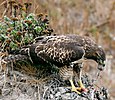User:Eliezg/Sandbox
This article needs additional citations for verification. (May 2007) |
Ecology (from Greek: οἶκος, oikos, "house, household, housekeeping, or living relations" ; -λογία, -logia, "study of") is the interdisciplinary scientific study of life processes explaining adaptations, external relations and interaction among organisms, the flux of materials and energy through living communities, the successional development of ecosystems, and the abundance and distribution of organisms in context of their environment.[1][2] In this context, the "environment" refers to all factors and scales of study that are external to the organism, including abiotic factors such as temperature, radiation, light, chemistry, climate and geology, and biotic factors, including genes, cells, organisms, members of the same species (conspecifics) and other species that share a habitat.[3]
Ecology is distinguished from natural history in its focus not only on the description and cataloging of natural phenomena, but on examining and understanding the processes of interaction between ecological agents.[4] Ecological interactions can include: population processes, including reproductive behavior, mortality, bioenergetics, migrations, colonizations and invasions of species in new habitats; interspecific interactions such as predation, competition, parasitism and mutualism; plant and animal community structures and their function and resilience; and biogeochemical cycling of energy and nutrients from the molecular scale to the planetary scale. Because of the great range of spatial and temporal scales at which ecological processes occur, it has been identified as a truly holistic science.[4]
Because of its vast scope, ecological science is often closely related to other disciplines. Thus, molecular ecology addresses ecological questions using tools from genetics, paleoecology uses tools from archeology, and theoretical ecologists use often highly complex mathematical models to explore how ecosystems and their elements function.
Aside from pure scientific inquiry, ecology is also a highly applied science. Much of natural resource management, such as forestry, fisheries, wildlife management and habitat conservation is directly related to ecological sciences and many problems in agriculture, urban development and public health are informed by ecological considerations.
The term "ecology" has also been appropriated for philosophical ideologies like social ecology and deep ecology and is sometimes used as a synonym for the natural environment or environmentalism. Likewise "ecological" is often taken in the sense of environmentally friendly.
References
[edit]- ^ Smith, R. (2000). Ecology and Field Biology. (6th ed.). Prentice Hall. ISBN 0321042905.
{{cite book}}: Unknown parameter|coauthors=ignored (|author=suggested) (help) - ^ Begon, M. (2006). Ecology: From individuals to ecosystems. (4th ed.). Blackwell. ISBN 1405111178.
{{cite book}}: Unknown parameter|coauthors=ignored (|author=suggested) (help) - ^ Campbell, Neil A. (2006). Biology: Exploring Life. Boston, Massachusetts: Pearson Prentice Hall. ISBN 0-13-250882-6.
{{cite book}}: Unknown parameter|coauthors=ignored (|author=suggested) (help) - ^ a b Odum, E. P. (1977). "The emergence of ecology as a new integrative discipline". Science. 195 (4284): 1289–1293. doi:10.1126/science.195.4284.1289. PMID 17738398.





